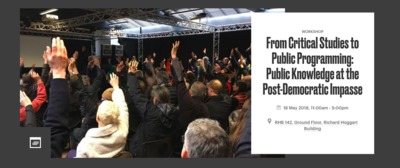Being Visible at the ICA
Reckitt, Helena. 2018. 'Being Visible at the ICA'. In: From Critical Studies to Public Programming: Public Knowledge at the Post-Democratic Impasse. Goldsmiths, University of London, United Kingdom 18 May 2018. [Conference or Workshop Item]
![[img]](https://research.gold.ac.uk/24132/1.hassmallThumbnailVersion/From%20Critical%20Studies%20to%20Public%20Programming.png)
|
Image (From Critical Studies to Public Programming: Public Knowledge and the Post-Democratic Impasse)
From Critical Studies to Public Programming.png - Cover Image Available under License Creative Commons Attribution Non-commercial. Download (691kB) | Preview |
Abstract or Description
Contribution to the workshop 'From Critical Studies to Public Programming: Public Knowledge and the Post-Democratic Impasse,' organised by Janna Graham, Valeria Grazia, and Susan Kelly. The talk reflected on my experience programming queer-oriented talks and public events at the ICA, London, from 1990-1997 - a period in which the concept of queer held out the promise that previously well-regulated identity categories around gender and sexual preference were becoming more porous, less pure. Issues of the politics of visibility and the dangers of surveillance are considered, along with the potential for 'consent' as a force of politically mobilisation.
|
Item Type: |
Conference or Workshop Item (Talk) |
||||
| Additional Information: |
The symposium charted the impetus for Critical Studies programmes in Art Schools since the 1970s, to the proliferation of discursive events in the neoliberal art world today. The term 'public programming’, in use at least since the 1990s, has arisen as a framework to speak about pedagogical initiatives across various public cultural institutions. It continues legacies from gallery education, new institutionalism, and independent pedagogic projects, which have contributed to the formation of art audiences. This symposium explored the trajectory of Critical and Complementary Studies courses in post-Coldstream art schools, often feminist and Marxist in orientation, to the phenomena of public programming. What does it mean today when art institutions host art school’s Critical Studies courses (eg, ICA) and when universities brand and advertise their evening lectures series as Public Programmes? What is the relationship between the discursive spaces of the gallery and the art school? How do we move from the relentless production of critical thematics, and move toward new forms of public pedagogy? This was the third research event in the Public Programming series, which explores how the democratic and critical premises that were the basis of a publicly produced culture and debate are now becoming undone, caught in the paradoxes of post-democratic institutions and under the pervasive push of event economies. Schedule 13.15–14.15 Lunch 14.15–14.45 Yaiza Hernández Velázquez (Central St Martins) 15.45–16.00 Break |
||||
| Departments, Centres and Research Units: |
|||||
| Dates: |
|
||||
| Event Location: |
Goldsmiths, University of London, United Kingdom |
||||
| Date range: |
18 May 2018 |
||||
| Item ID: |
24132 |
||||
| Date Deposited: |
28 Aug 2018 11:58 |
||||
| Last Modified: |
29 Apr 2020 16:49 |
||||
|
URI: |
View statistics for this item...
 |
Edit Record (login required) |

 Tools
Tools Tools
Tools
